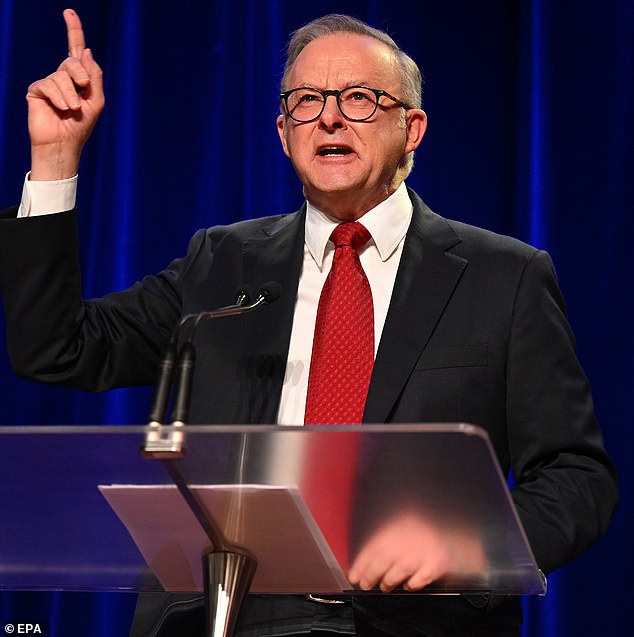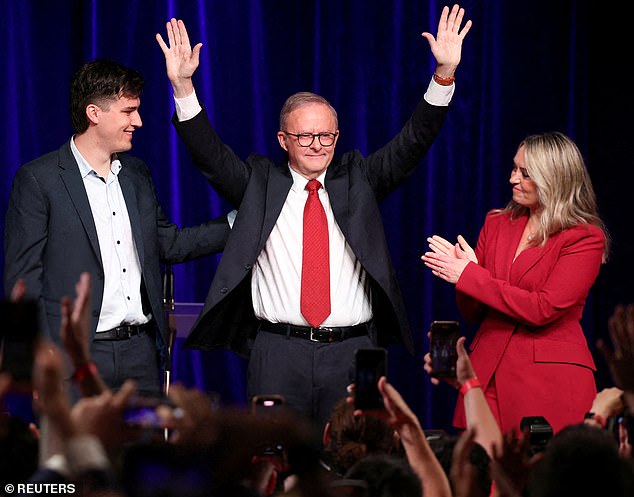Anthony Albanese knows the trick to thriving politically: keep big business calm and onside while continuing to look after the Labor base.
The PM laid out his strategy in plain view at the Business Council of Australia’s dinner this week.
His pitch was all about certainty, stability and the importance of working in partnership.
That’s code for ensuring that the top end of town doesn’t mobilise against him in the way it did against Labor leaders of the past.
Albo is even prepared to entertain the idea of cutting company taxes, even if only through targeted credits or incentives, as long as it locks in the support of the business community.
Sure, there’s chatter about other business imposts, such as a levy on cash flow. But no-one seriously thinks Albo will go to war with the corporate sector.
His ask to them on climate change will be little more than a polite nod towards net zero targets for 2035, framed to wedge the Coalition rather than force major sacrifices from business.
At the same time, the PM will keep using the nation’s credit card (meaning more debt as budget deficits grow) to shore up Labor’s base.
That would look like more energy bill rebates, if necessary, closer to the next election, bigger rent assistance as a nod to the housing crisis, and yet more Medicare spending to wedge the Coalition.
Handouts dressed up as cost of living relief will continue to be the order of the day unless economic growth picks up.

Anthony Albanese has a simple formula that he is hoping will cement him as the dominant political figure of this generation – handouts, peace with big business, and the middle class taxed through the nose
The political aim is simple enough, but where does it leave middle Australia? The answer is… nowhere good.
The voters Liberal PM Robert Menzies once called the forgotten people are paying for the handouts and the sops.
Australia leans heavily on personal income taxes compared to other developed countries.
Bracket creep does the government’s budget heavy lifting year after year. That means our tax thresholds aren’t indexed, so, as wages rise, people are pushed into higher income brackets without any real increase in spending power.
By OECD standards, wage earners here now carry one of the heaviest personal tax burdens in the advanced world.
In 2023, Australia saw the biggest jump in average income tax rates across the developed world, driven largely by the quiet ratcheting up of bracket creep.
For middle income households that don’t qualify for means-tested handouts, it means falling further behind despite working harder than ever.
This is Albo’s strategy laid bare. Big business gets soothing words and maybe a tax cut to placate them.
Lower socio-economic groups get targeted payments and rebates.
But middle Australia (dual-income families that are mortgage-strapped) keep paying taxes through the nose.
Labor has become adept at pandering to middle Australia without actually looking after them.
Childcare help is useful and gets media attention, but it’s no substitute for lowering the burden of income taxes.
The HECS cut Albo took to the last election benefits younger voters, who are by-and-large yet to be stung by higher income taxes as they get older.
Middle Australia will continue to hear talk about tax reform but see little beyond tinkering, because bracket creep is too convenient for a government addicted to easy revenue to give up.

The Prime Minister has ambitious plans for a third term — he’s just got to get one first
Meanwhile migrant communities who qualify as middle income families will naturally drift Labor’s way in the wake of some of the offensive rhetoric Liberals such as Jacinta Price are promoting.
These new Australians were once important new conservative voters attracted to the Liberals, but not so much these days.
And Labor knows it. Albo thinks he can glide through using this formula, keeping his critics quiet at both ends of the spectrum while courting the backing of new citizens.
But the strategy isn’t without risks.
Middle Australia is watching their pay packets shrink in real terms while their taxes stay high.
They are the forgotten people of today’s politics, also forgotten by a Liberal Party immersed in internal turf wars.
However, if the great swathe of middle Australia decides they’ve had enough of being the silent donors to everyone else’s preferred treatment, Albo’s carefully managed coalition of support could come crashing down.
For the two-party fight to once again become a close contest Liberals need to actually become the party of debt reduction and smaller government, alongside promoting lower taxes rather than just talking about it.
But that involves policy work in opposition, not just playing games.
At the moment – especially given the dysfunctional state of the degraded opposition – that appears unlikely.
